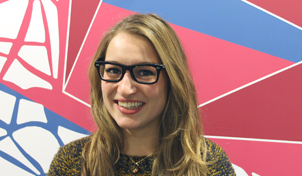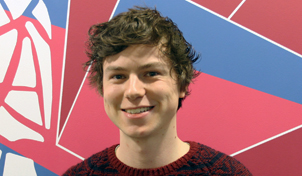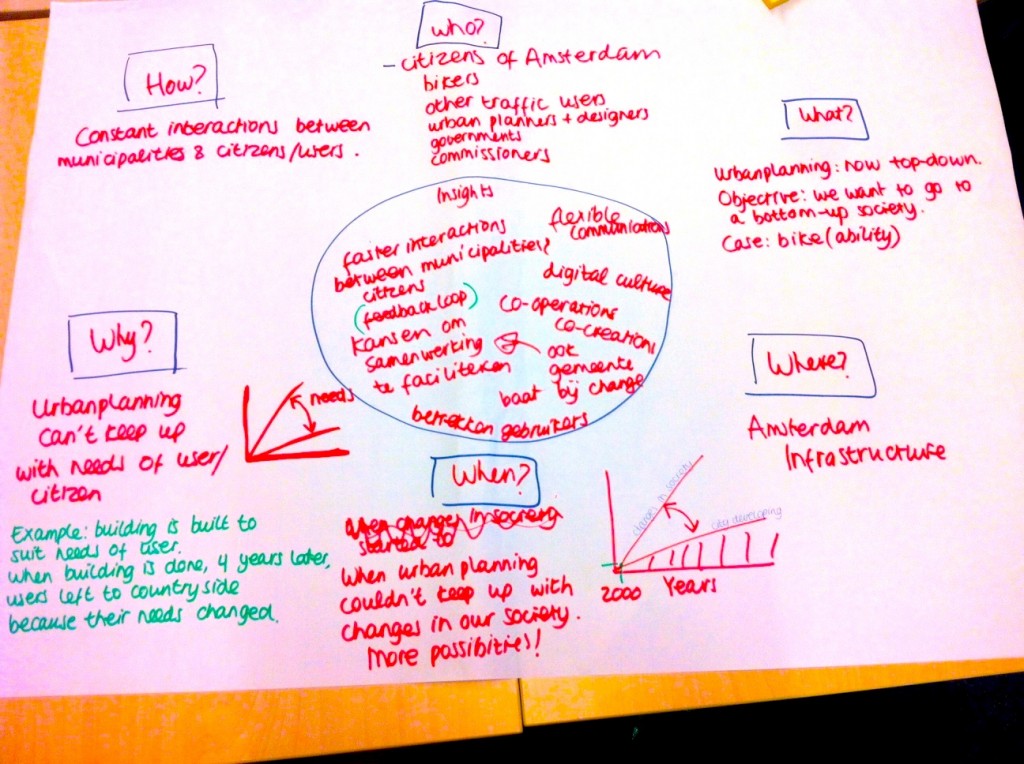Getting ‘the designer mindset’ with Charlie Mulholland
Today our brains have been challenged. During the workshop Problem Definition, given by Charlie Mulholland, we were searching for the real core of the given problem. The problem, according to the project proposal, says:
‘How can we make use of digital media to engage and empower a public
around the issue of cycling in Amsterdam?’
Clear, isn’t it? No, it isn’t yet at all. As designers we’re given the task to answer this question, which will be the design for the solution and to actual produce this solution. But before we can do that, we have to question all the reasons and the total context of the brief: who is our assigner? Why is he asking us this? What are his motives? Which problem has leaded to this question and why is this problem a problem? Who are our stakeholders and potential users?
At first, we did nicely what we were asked but we didn’t make any progress in the thinking process so we didn’t find any new insights. We only were repeating what we already knew before this morning. Fortunately, this was just Charlie’s reason to arrange this workshop, so he encouraged us to think a step further by filling in the map below.
By answering these questions, we focused on the motives of the assigner, which has lead to the given question about biking. As you can see in the picture above, we ended up in a line of thought about the whole process of city making. At the end of the workshop we were able to invent this raw temporary conclusion:
The process of city making is changing from ‘top down’ to ‘bottom up’ because of the overall changes in society. There isn’t a steady or highly supported new collaboration between municipality, designers and the public yet. It’s our task to find a potential solution in this process. Bikeability in Amsterdam is a given case, so we can focus on one topic, but our project will also provide new insights for other themes in the future of city making.
Unfortunately we had to leave the workshop early, because we wanted to attend a talk of Jan Rotmans in the Zuiderkerk. Thanks a lot, Charlie, for encouraging and forcing us to attack the problem! If we need some inspiration in the future, we’ll find you!
HALLELUJAH – Let’s make this world a better place
Jan Rotmans – Talk: De stad als transitie ‘The City as transition‘. 13 February, De Zuiderkerk.
In the first place, it was a bit of a weird experience to enter a church for a scientific talk, but the outcomes where inspiring. It felt like a few pieces of the massive puzzle found each other. Jan Rotmans was talking about the shifting of different time periods. He has the opinion that the old-fashioned way of top down planning in city development doesn’t suit to our present society anymore. The fixed planning and production doesn’t fit to the characteristics of nowadays society, which changes quickly. This period of change will not stop in the coming decades, so we have to find a way to work around it. A new collaboration between citizens, institutes and designers, is needed. The same translation of the problem we we discovered during this mornings workshop!
Rotmans mentioned that already lots of small groups of citizens are trying to build the city from bottom up, but this leads to a countless number of small initiatives. They are temporary, the founders of the different project don’t work together, which leads to inefficiency and they aren’t supported by the government in many cases. Anyway, they don’t provide a solid base for the development of the society.
According to Rotmans, in the new city planning workaround, the government still plays a role. They aren’t the ones who plan city building on their own anymore, but they will facilitate and support opportunities for the rest of the people to participate in city development. The government has to give room to bottom up initiatives, but places those into a more broader structure, so the new development process will be solid for all of us.
Our Calling?
Oke, this brought us a lot of inspiration. Sometimes, Jan Rotmans statements appear to be a bit idealistic, but as he said in the beginning of his talk: it is an argument, not a concrete plan. He made us aware of one of the downfalls of our assignment: to fall back in making a tiny bike application which in the end only fits in the group of those small initiatives, which aren’t supported by a larger public and only cause more diversity and inefficiency.
Cristina Ampatzidou invited us to the talk. She works already as an embedded researcher for the Amsterdam Hackable Metropolis project for a longer period of time. While she will continue with her own research, she’ll support in the bikeability project we focus on. She made an interesting remark to the argument of Rotmans, which we also can keep in mind:
‘Ideas like “participation”, “bottom-up”, “open-source” are very alluring but their strength lies, among others, on the fact that they are not directed from the top. I would be concerned about the municipalities placing themselves solely on the role of “facilitators”, as not all problems can be addressed in this way and not everybody citizen is equally able or willing to contribute. The emerging phenomena of active citizenship should not become an excuse for local authorities to offload their responsibilities’
Oke, this day provided us lots of theoretical input, we are curious what Martijn de Waal, our assigner will tell us about this. We’ll meet him next week. A more applied approach to this topic in the context of the city of Amsterdam, mobility in general and bikeability is on the agenda this afternoon, at the Open Data FWD at Waag Society.







